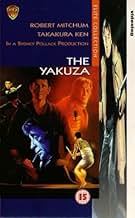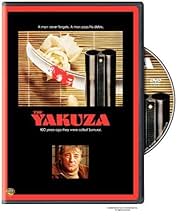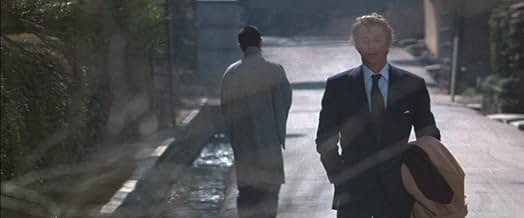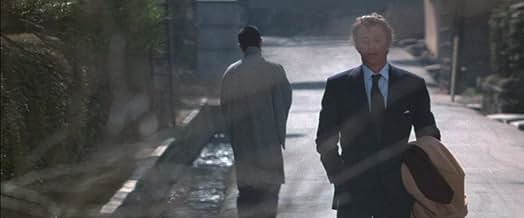IMDb-BEWERTUNG
7,2/10
11.190
IHRE BEWERTUNG
Der amerikanische Privatdetektiv Harry Kilmer kehrt nach Japan zurück, um die entführte Tochter eines Freundes aus den Fängen der Yakuza zu befreien.Der amerikanische Privatdetektiv Harry Kilmer kehrt nach Japan zurück, um die entführte Tochter eines Freundes aus den Fängen der Yakuza zu befreien.Der amerikanische Privatdetektiv Harry Kilmer kehrt nach Japan zurück, um die entführte Tochter eines Freundes aus den Fängen der Yakuza zu befreien.
- Regie
- Drehbuch
- Hauptbesetzung
Ken Takakura
- Ken Tanaka
- (as Takakura Ken)
Eiji Okada
- Toshiro Tono
- (as Okada Eiji)
Keiko Kishi
- Eiko Tanaka
- (as Kishi Keiko)
Kyôsuke Machida
- Jiro Kato
- (as Kyosuke Machida)
Eiji Gô
- Shiro 'Spider' Tanaka
- (as Go Eiji)
Empfohlene Bewertungen
A neglected classic of 70s film-making, this is perhaps the most "Japanese" movie ever made by a non-Japanese. The story is rich and multi-layered, featuring not one but two sets of star-crossed lovers in a brilliant and melancholy examination of contrasting themes of memory, secrets and betrayal, friendship, honor and obligation. The script is both literate and intricate; the characters' motives are almost always obscure until another layer of deception is stripped away.
Only Robert Mitchum could have done justice to the role of Harry Kilmer, a retired detective returning to Japan for the first time in many years to rescue his old Army friend Tanner's daughter, who has been kidnapped by the Yakuza in a dispute over a debt Tanner owes them. When Kilmer arrives in Japan, he seeks out Ken, the brother of his ex-lover Eiko (played by the astoundingly lovely and talented Kishi Keiko). Ken is a lone wolf, an ex-Yakuza who now runs a martial arts school, and though there is obviously no love lost between the two, Kilmer knows Ken carries an obligation to him for rescuing Eiko and her infant daughter in the early days of the Occupation.
Kilmer is still bitter about the past, deeply wounded by his love for Eiko, who would not marry him even though she loves him deeply. This was the reason why he left Japan and never meant to return.
Now, with Ken's reluctant help, he rescues Tanner's daughter, but this only leads to an intensifying spiral of tragic consequences, because nothing is quite what it seems. Only when Kilmer begins to understand the truth of the situation is he able to act constructively.
Everyone in this film, from Brian Keith to Herb Edelman to Richard Jordan (in one of his first starring roles) turns in a first-rate performance. James Shigeta and Christina Kobuko also deserve honorable mention. But it is Mitchum and Takakura Ken who make this movie.
This is not an action film in the sense of later -- and far inferior -- efforts like "The Challenge" and "Black Rain", though there are scenes of intense and graphic violence. Nor does it have a happy ending, although some of the characters do ultimately find redemption and a hope of reconciliation.
"The Yakuza" is a work that deserves a much larger audience, one which will totally engage a thoughtful viewer with its universal themes worked out against the background of a very different culture, with its own mindset and traditions. I give it my highest recommendation.
Only Robert Mitchum could have done justice to the role of Harry Kilmer, a retired detective returning to Japan for the first time in many years to rescue his old Army friend Tanner's daughter, who has been kidnapped by the Yakuza in a dispute over a debt Tanner owes them. When Kilmer arrives in Japan, he seeks out Ken, the brother of his ex-lover Eiko (played by the astoundingly lovely and talented Kishi Keiko). Ken is a lone wolf, an ex-Yakuza who now runs a martial arts school, and though there is obviously no love lost between the two, Kilmer knows Ken carries an obligation to him for rescuing Eiko and her infant daughter in the early days of the Occupation.
Kilmer is still bitter about the past, deeply wounded by his love for Eiko, who would not marry him even though she loves him deeply. This was the reason why he left Japan and never meant to return.
Now, with Ken's reluctant help, he rescues Tanner's daughter, but this only leads to an intensifying spiral of tragic consequences, because nothing is quite what it seems. Only when Kilmer begins to understand the truth of the situation is he able to act constructively.
Everyone in this film, from Brian Keith to Herb Edelman to Richard Jordan (in one of his first starring roles) turns in a first-rate performance. James Shigeta and Christina Kobuko also deserve honorable mention. But it is Mitchum and Takakura Ken who make this movie.
This is not an action film in the sense of later -- and far inferior -- efforts like "The Challenge" and "Black Rain", though there are scenes of intense and graphic violence. Nor does it have a happy ending, although some of the characters do ultimately find redemption and a hope of reconciliation.
"The Yakuza" is a work that deserves a much larger audience, one which will totally engage a thoughtful viewer with its universal themes worked out against the background of a very different culture, with its own mindset and traditions. I give it my highest recommendation.
Superb East-meets-West movie, I suspect largely due to Schrader's insight. Takakura Ken's performance really steals the show, though all actors are more than capable; Mitchum gives a great performance again. Not a martial arts movie, but contains a katana showdown that I can watch over and over again without finding fault [more believable than anything you'll see in 'Kill Bill'].
The story is gorgeously convoluted, keeping it's secrets to the very end, in a fitting Japanese manner. Action scenes are relatively restrained, and the story tells how Mitchum's character finally comes to understand Takakura Ken's character, and his apparently icy antagonism. When can we see a DVD copy?!
The story is gorgeously convoluted, keeping it's secrets to the very end, in a fitting Japanese manner. Action scenes are relatively restrained, and the story tells how Mitchum's character finally comes to understand Takakura Ken's character, and his apparently icy antagonism. When can we see a DVD copy?!
I stumbled across this movie, back when I was in college, on late night television. At the time, I wasn't a Robert Mitchum fan. I always thought Mitchum had a way of sauntering through film roles, not always giving his best. The Yakuza, made when Mitchum was 58 years old, utilizes his style and persona to its maximum potential. He's world-weary, he's been through the mill and he's come out wiser, but not necessarily harder for it.
Written by Paul Schrader and Robert Towne, The Yakuza shows us a different side of the Gangster world than we have been privy to before. This is not a movie of good vs. bad; it's a movie about loyalty and honor to friends and family. We follow Mitchum as Harry Kilmer on a mission to save a friends daughter. For most movies made these days, that premise would be enough, but The Yakuza is deeply layered and far more interesting than that. It turns out that Harry had been in Japan after WWII and had fallen in love with a beautiful woman, Eiko. 30 years later Harry is back in Japan, much has changed, but his feelings haven't.
Harry teams up with Ken Tanaka, Eiko's brother, to find the kidnapped girl. Samurai swords slash and guns blaze, adding intense, well-choreographed action as the plot thickens and Harry realizes that this is no ordinary rescue. We learn a lot about the characters in the movie, from Harry and Eiko to Ken Tanaka and Harry's buddy George, but more than that we learn about Japan and its infamous and historic gangster world. This is a classic movie in every sense of the word and should be viewed as such. And if you're not a fan of Robert Mitchum before seeing this movie, you will be afterwards.
Written by Paul Schrader and Robert Towne, The Yakuza shows us a different side of the Gangster world than we have been privy to before. This is not a movie of good vs. bad; it's a movie about loyalty and honor to friends and family. We follow Mitchum as Harry Kilmer on a mission to save a friends daughter. For most movies made these days, that premise would be enough, but The Yakuza is deeply layered and far more interesting than that. It turns out that Harry had been in Japan after WWII and had fallen in love with a beautiful woman, Eiko. 30 years later Harry is back in Japan, much has changed, but his feelings haven't.
Harry teams up with Ken Tanaka, Eiko's brother, to find the kidnapped girl. Samurai swords slash and guns blaze, adding intense, well-choreographed action as the plot thickens and Harry realizes that this is no ordinary rescue. We learn a lot about the characters in the movie, from Harry and Eiko to Ken Tanaka and Harry's buddy George, but more than that we learn about Japan and its infamous and historic gangster world. This is a classic movie in every sense of the word and should be viewed as such. And if you're not a fan of Robert Mitchum before seeing this movie, you will be afterwards.
The Yakuza introduced we occidentals to the term the Japanese use for their various crime families. Probably after the wide acceptance of both the Godfather films, the American public was ready to see what organized crime looked like in another culture.
La Cosa Nostra, the Mafia, all those phrases we use for Italian organized crime certainly had their rituals and traditions. But as we learn in watching this film they have nothing on the Yakuza.
Robert Mitchum plays a private detective who works both sides of the law back in the states and he's hired by crime boss Brian Keith to rescue his daughter who was kidnapped by one of the Yakuza crime families in lieu of a shipment of weapons Keith was supposed to deliver. Coming along with him is young Richard Jordan whose father was a friend of both Mitchum and Keith as backup.
The mission is accomplished, but Mitchum and Jordan find the situation is a whole lot more complex than they were led to believe. In addition Mitchum gets involved with an old girl friend from the days when he was a military policeman during the postwar American occupation. She's the key to getting help from a former Yakuza member in their quest.
The American actors perform well here and oriental players James Shigeta and Japanese film star Takakura Ken are well cast as feuding Yakuza brothers. You will not question why Takakura Ken is known as the Japanese Clint Eastwood after seeing The Yakuza.
Director Sydney Pollack shows a real reverence and respect for the traditions of another culture. The Yakuza is both entertaining and informative and should not be missed.
La Cosa Nostra, the Mafia, all those phrases we use for Italian organized crime certainly had their rituals and traditions. But as we learn in watching this film they have nothing on the Yakuza.
Robert Mitchum plays a private detective who works both sides of the law back in the states and he's hired by crime boss Brian Keith to rescue his daughter who was kidnapped by one of the Yakuza crime families in lieu of a shipment of weapons Keith was supposed to deliver. Coming along with him is young Richard Jordan whose father was a friend of both Mitchum and Keith as backup.
The mission is accomplished, but Mitchum and Jordan find the situation is a whole lot more complex than they were led to believe. In addition Mitchum gets involved with an old girl friend from the days when he was a military policeman during the postwar American occupation. She's the key to getting help from a former Yakuza member in their quest.
The American actors perform well here and oriental players James Shigeta and Japanese film star Takakura Ken are well cast as feuding Yakuza brothers. You will not question why Takakura Ken is known as the Japanese Clint Eastwood after seeing The Yakuza.
Director Sydney Pollack shows a real reverence and respect for the traditions of another culture. The Yakuza is both entertaining and informative and should not be missed.
Harry Kilmer is a retired detective whiling away his days at the beach in Malibu. An old friend named George Tanner contacts him with a problem: his daughter has been kidnapped by the Yakuza, with whom Tanner was conducting business. Harry is dispatched to Tokyo to get her back, and while there rekindles his relationship with Eiko, a woman he once loved. For help with his mission, Harry calls upon Eiko's estranged brother Ken, who has an obligation to him- or giri- for coming to Eiko's aid years before. As they battle the Yakuza, Harry comes to realize that Ken and Eiko's relationship is more complicated than he realized, and that he has his own giri he may never be able to repay.
Directed by Sydney Pollack, 'The Yakuza' is a stylish crime drama that entertains, though suffers from tonal and pacing issues galore. Originally written by Paul Schrader, it was intended as a vehicle for Lee Marvin under the direction of Robert Aldrich; though that film was never made. Instead, Pollock was hired to direct and Schrader's original script was considerably altered by Robert Towne. The end result is a film of contrasting styles, attempting- largely in vain- to balance Schrader's hard-edged original material with the romanticism of Pollock and Towne's approach.
Perhaps with Schrader's script in hand, a director like Aldrich- well versed in the art of making action pictures- could have captured the violent sequences in 'The Yakuza' with style and verve. With Towne's, Pollock doesn't, seeming more comfortable with dialogue heavy scenes and wistful set-pieces. More often than not, these feel ponderous and overly-expositional, with too much talking and not enough movement. In contrast, the way Pollock captures the violence seems rushed and cursory.
While we do empathize with the central three characters- Harry, Eiko and Ken- the rest are ill-defined, blurry caricatures one can't help but forget. The film does contain powerful moments, and arrives at a sensational conclusion, but the journey there is one fraught with issues. It is a shame the narrative and Pollock's approach to it is so muddled and uncertain, as there are brilliant sequences in 'The Yakuza'- and it's a triumph in many other respects.
Kôzô Okazaki's cinematography, for one, is exceptional. He shoots the thoroughfares of Tokyo strikingly, in a manner which heightens the city's neon-streaked coldness. Watching Harry somberly stalk the city's side-streets or graveyards is arresting, while the intricate lighting in interior shots captures one's attention and keeps it held. Dave Grusin's jazzy score is also worth mentioning, as it lends to proceedings an ambience of film-noir that feels most appropriate and atmospheric.
'The Yakuza' also boasts impressive performances from the cast that one would be remiss not to mention. Robert Mitchum stars as Harry, delivering one of the finest performances from the latter half of his career. Arguably one of the most naturalistic actors of all time, he never resorted to theatrics or seemed anything less than fully authentic. His performance here as Harry is thoughtful, powerfully understated and proof that less really does mean more when it comes to acting. How the Academy never recognized his greatness is frankly scandalous; as whether in 'The Yakuza' or anything else, Mitchum was always perfect.
His co-star Ken Takakura subscribes to the same playbook as he does, delivering a restrained, masterful performance of great subtlety and style. Starring as Ken, Takakura has a magnetic screen presence and an enigmatic gravitas; ensuring you'll be staring his way anytime he's on screen. Richard Jordan also does strong work as an associate of Harry's named Dusty, and Keiko Kishi is utterly beguiling as Eiko; sharing with Mitchum a very warm, seemingly authentic chemistry.
Sydney Pollock's 'The Yakuza' is an entertaining film, though it may have been better in the hands of a different director. While it has tonal issues and the dialogue is a little stilted in places, the cinematography from Kôzô Okazaki is captivating, and Dave Grusin's score is atmospheric. The performances are routinely brilliant too, with Mitchum and Ken Takakura doing especially fine work. Taking all that into account, while the saga of blood, love and honor that is 'The Yakuza' is well worth seeing; it is not a masterpiece.
Directed by Sydney Pollack, 'The Yakuza' is a stylish crime drama that entertains, though suffers from tonal and pacing issues galore. Originally written by Paul Schrader, it was intended as a vehicle for Lee Marvin under the direction of Robert Aldrich; though that film was never made. Instead, Pollock was hired to direct and Schrader's original script was considerably altered by Robert Towne. The end result is a film of contrasting styles, attempting- largely in vain- to balance Schrader's hard-edged original material with the romanticism of Pollock and Towne's approach.
Perhaps with Schrader's script in hand, a director like Aldrich- well versed in the art of making action pictures- could have captured the violent sequences in 'The Yakuza' with style and verve. With Towne's, Pollock doesn't, seeming more comfortable with dialogue heavy scenes and wistful set-pieces. More often than not, these feel ponderous and overly-expositional, with too much talking and not enough movement. In contrast, the way Pollock captures the violence seems rushed and cursory.
While we do empathize with the central three characters- Harry, Eiko and Ken- the rest are ill-defined, blurry caricatures one can't help but forget. The film does contain powerful moments, and arrives at a sensational conclusion, but the journey there is one fraught with issues. It is a shame the narrative and Pollock's approach to it is so muddled and uncertain, as there are brilliant sequences in 'The Yakuza'- and it's a triumph in many other respects.
Kôzô Okazaki's cinematography, for one, is exceptional. He shoots the thoroughfares of Tokyo strikingly, in a manner which heightens the city's neon-streaked coldness. Watching Harry somberly stalk the city's side-streets or graveyards is arresting, while the intricate lighting in interior shots captures one's attention and keeps it held. Dave Grusin's jazzy score is also worth mentioning, as it lends to proceedings an ambience of film-noir that feels most appropriate and atmospheric.
'The Yakuza' also boasts impressive performances from the cast that one would be remiss not to mention. Robert Mitchum stars as Harry, delivering one of the finest performances from the latter half of his career. Arguably one of the most naturalistic actors of all time, he never resorted to theatrics or seemed anything less than fully authentic. His performance here as Harry is thoughtful, powerfully understated and proof that less really does mean more when it comes to acting. How the Academy never recognized his greatness is frankly scandalous; as whether in 'The Yakuza' or anything else, Mitchum was always perfect.
His co-star Ken Takakura subscribes to the same playbook as he does, delivering a restrained, masterful performance of great subtlety and style. Starring as Ken, Takakura has a magnetic screen presence and an enigmatic gravitas; ensuring you'll be staring his way anytime he's on screen. Richard Jordan also does strong work as an associate of Harry's named Dusty, and Keiko Kishi is utterly beguiling as Eiko; sharing with Mitchum a very warm, seemingly authentic chemistry.
Sydney Pollock's 'The Yakuza' is an entertaining film, though it may have been better in the hands of a different director. While it has tonal issues and the dialogue is a little stilted in places, the cinematography from Kôzô Okazaki is captivating, and Dave Grusin's score is atmospheric. The performances are routinely brilliant too, with Mitchum and Ken Takakura doing especially fine work. Taking all that into account, while the saga of blood, love and honor that is 'The Yakuza' is well worth seeing; it is not a masterpiece.
Wusstest du schon
- WissenswertesMartin Scorsese wanted to direct after Hexenkessel (1973), but the producers wanted Sydney Pollack. Scorsese is on record that he would very much have liked to direct the film and was disappointed that he was passed over. However, he got to direct Alice lebt hier nicht mehr (1974) instead after being sought out by Ellen Burstyn. "Alice" ended up making more than 20 times its budget and won Burstyn an academy award, while this film became a box office bomb.
- PatzerThe plane that Kilmer is boarding at the end is a Boeing 707; the one shown taking off in the last scene is a 727.
- Alternative VersionenFor the Spanish Castilian version all the dialogues were dubbed to Spanish, even the Japanese lines.
- VerbindungenFeatured in ...Promises to Keep (1974)
Top-Auswahl
Melde dich zum Bewerten an und greife auf die Watchlist für personalisierte Empfehlungen zu.
- How long is The Yakuza?Powered by Alexa
Details
Box Office
- Budget
- 5.000.000 $ (geschätzt)
- Laufzeit
- 1 Std. 52 Min.(112 min)
- Sound-Mix
- Seitenverhältnis
- 2.39 : 1
Zu dieser Seite beitragen
Bearbeitung vorschlagen oder fehlenden Inhalt hinzufügen


















